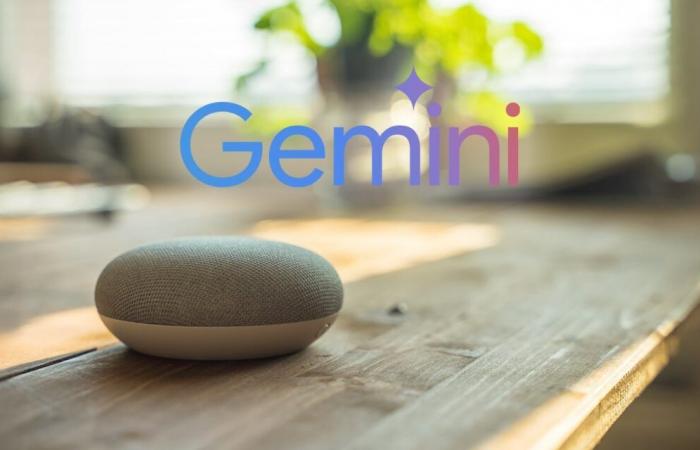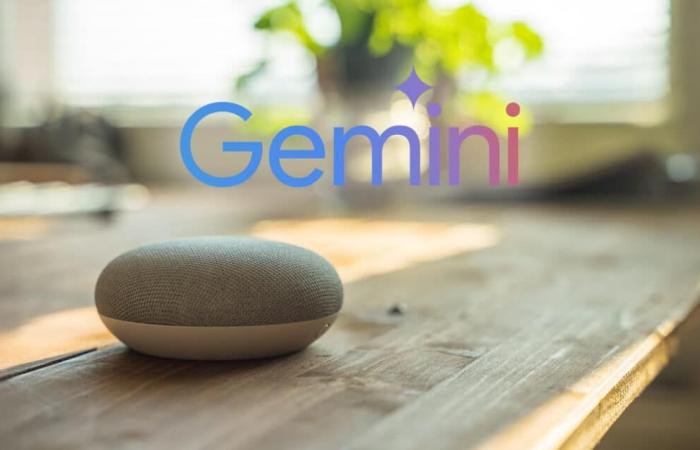This is news that we have been waiting for months, here it is about to become reality. According to several American media, Google is preparing to transform the user experience of its connected speakers with the integration of AI Gemini in Google Home. This upcoming update, spotted in the application code, promises to make Google Assistant more intelligent and intuitive, combining contextual analysis and natural language commands.
A Gemini extension soon on Google Home? – © Adobe Stock
AI for enriched interactions on Google Home speakers
The question often comes up in our community dedicated to the connected home: why Amazon and Google, who have each unveiled generative AI, have still not integrated any into Alexa and Google Home?
The answer is simple: it's more complicated than it seems. Indeed, our voice assistants are clever mixtures of scattered artificial intelligence (AI) bricks and adding generative AI is not so easy. There's no question of simply replacing them either, because while large language models excel at answering our questions, they are not made to perform simple tasks like turning on a light or sending a robot vacuum cleaner to clean a room. room of the house. As the CEO of Amazon recently explained about Alexa, we therefore need to “reorganize their brains”. A task that takes time, but if Andy Jassy gave his teams one more year to succeed in relaunching Alexa, things seem to be moving a little faster on the Mountain View side.
According to 9to5Google, elements of code present in version 3.26.1.3 of the Google Home application for Android indicate the upcoming integration of Gemini. Still not activated, these new features should make Google Assistant more intelligent, or rather more efficient, the latter now being able to call on generative AI when it is not able to respond itself. Like the Google Home extension for Gemini, this is therefore a Gemini extension for Google Home.
Gemini has already started improving Google Home features. With advanced AI, Nest cameras are no longer limited to detecting motion. They now understand the context of events, like identifying an animal in your yard or recognizing a delivery. Additionally, users can ask specific questions like: “Was there a delivery truck today?” »and receive specific responses accompanied by summaries of relevant activities.
This update also makes it easier to create routines. Thanks to the functionality “Help me create”users will be able to easily ask Google Assistant to program complex automations, such as locking doors and turning off lights, simply by describing their need in natural language. Even with requests as vague as “help me save energy,” Gemini will allow Assistant to translate them into triggers and actions.
Smoother interaction with Google Assistant
Google Assistant will also benefit from the capabilities of Gemini, which will improve its conversational qualities. AI will allow him to better handle interruptions, follow-up questions and different nuances of language. He will be able, for example, to adjust his responses or react to changes in a conversation. Questions, particularly follow-up questions, will no longer need to be formulated with a specific or precise structure as is currently the case. If you change your mind about the question or the voice command, it will still be able to answer you. The goal is to facilitate two-way exchanges with Google Assistant while maintaining context. Like in an everyday conversation.
This development will be accompanied by new, more natural, warmer and better-paced voices, but also by better management of basic functionalities, such as timers or multimedia playback, making exchanges more natural and practical.
Towards an even more connected home
The gradual rollout of Gemini to Google Home will first be offered to Nest Aware subscribers as part of the programme Preview. Its debut is planned “later this year”, as the saying goes, before a wider launch to United States in 2025. For Europe, we will probably have to wait a little longer, but things could go faster than we think, these large language models being particularly comfortable in translation. With these innovations, Google Home should become a central platform for a connected home that is not only practical, but also more intuitive and secure. We will obviously not fail to return to the subject in more detail.







